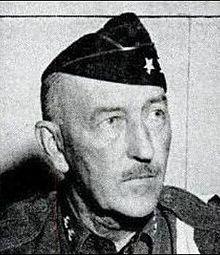Charles P. Hall
| Charles P. Hall | |
|---|---|

Charles P. Hall
|
|
| Born |
December 12, 1886 Sardis, Mississippi |
| Died | January 26, 1953 (aged 66) San Antonio, Texas |
| Buried at | Fort Sam Houston National Cemetery |
| Allegiance |
|
| Service/branch |
|
| Years of service | 1911–1948 |
| Rank |
|
| Commands held |
|
| Battles/wars | |
| Awards |
Distinguished Service Cross Distinguished Service Medal (2) Silver Star (4) Bronze Star Purple Heart |
Charles Philip Hall (December 12, 1886–January 26, 1953) was a senior officer of the United States Army who fought in both World War I and World War II. He is most notable for being the commander of XI Corps during World War II and the principal commander during the Battle of Bataan to liberate the Philippines from Japanese forces.
Hall was born in Sardis, Mississippi and attended the University of Mississippi from 1905 to 1907. He then entered the U.S. Military Academy at West Point and was commissioned in 1911 as a second lieutenant of infantry. He served with the 20th Infantry Regiment until 1914, when he became an instructor in mathematics at West Point. In August 1917, he transferred to the 23rd Infantry Regiment, and then went to France for World War I. In March 1918, he became the adjutant of the 3rd Infantry Brigade, 2nd Infantry Division. He served at Verdun, Chateau Thierry, at Soissons in the Marne Offensive, in the St. Mihiel sector, and at Champagne in the Aisne Offensive.
Hall received the Army Distinguished Service Cross, second to the Medal of Honor, for extraordinary heroism in action at Vierzy, France on July 18, 1918. His citation read: "At a critical time in the battle, when information was difficult to obtain, Lieutenant Colonel Hall, Brigade Adjutant, volunteered to report on the fighting in Vierzy, which was then in the hands of the enemy. Accompanying a group of French tanks, he entered the town under intense fire; and, during the advance, went forward through machine-gun fire and carried to safety a wounded man. He assisted materially in maintaining organization among the troops and established a first aid station at which many wounded were cared for, returning later to Brigade Headquarters with valuable information."
...
Wikipedia
